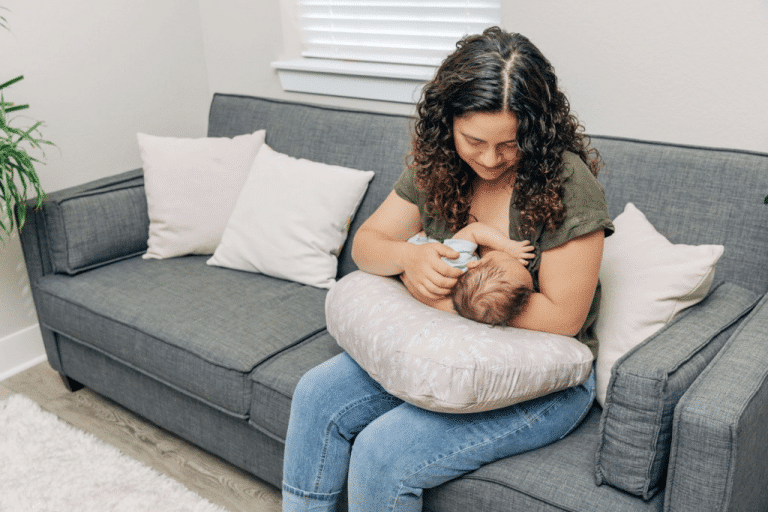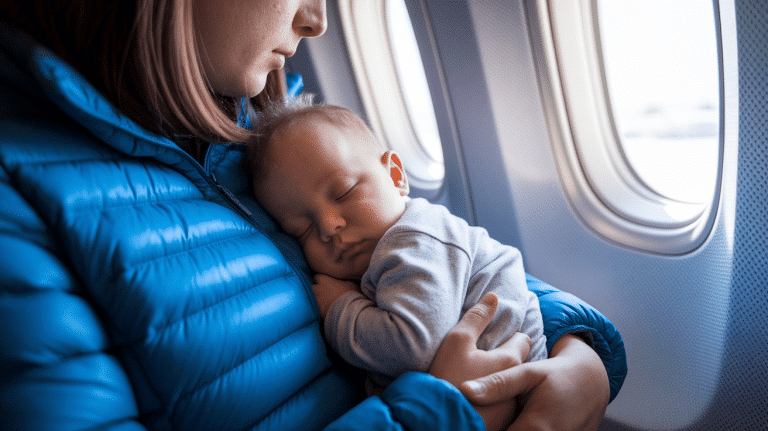As a sleep expert, I always hear it: “My baby only naps for 30 minutes!” I know how this feels.
You put your baby down, start making coffee, and they’re awake before you can take your first sip.
Short naps are common. Most babies under 5 months will take brief naps of 20-45 minutes.
But these small breaks aren’t enough for your baby’s growing brain and body.
Good naps help your baby learn better, stay happy, and sleep well at night.
When babies don’t get enough daytime sleep, they often become fussy and have trouble sleeping at bedtime.
Let me help you turn those quick, short naps into restful sleep periods.
The Basics of Baby Sleep Cycles
When I look at baby sleep patterns, I see they’re quite simple yet fascinating.
A baby’s sleep cycle lasts 45-50 minutes, while adults need 90-120 minutes per cycle.
Here’s what parents need to know: if your baby sleeps less than 45 minutes, they’ve completed just one cycle – we call this a short nap.
For good rest, babies should sleep longer than 90 minutes, linking two sleep cycles together.
I’ve found most sleep problems happen when babies wake between cycles.
That’s why some babies wake up after 30-45 minutes during naps. The key is helping them connect these cycles for better sleep.
Factors Influencing Sleep Duration
Let me share what I’ve learned about why babies sleep differently at various ages and how you can help them get better rest.
Growing and Changing Sleep Needs
As a sleep specialist, I notice that sleep needs change a lot as babies grow. Here’s what I tell parents about sleep at different ages:
From Birth to 3 Months:
- Your baby needs 14-17 hours of sleep daily
- They’ll sleep in small chunks throughout the day and night
- Most babies take 4-5 naps each day
At 3-4 Months:
- Sleep time stays at 14-16 hours
- Your baby starts showing more regular sleep patterns
- Naps become more steady, usually four naps per day
At 5-6 Months:
- Total sleep is about 13-15 hours
- Your baby likely takes 2-3 naps daily
- Morning naps often last 45-90 minutes
At 7-9 Months:
- Sleep needs are 12-14 hours
- Two main naps become common
- Each nap should last at least one hour
Making the Best Sleep Space
I always tell parents that where their baby sleeps matters just as much as when. Here’s what works best:
Room Temperature:
- Keep the room cool but comfortable
- Use a fan to help keep the air moving
- Check if your baby feels warm at the neck, not the hands
Light Control:
- Make the room very dark for sleep
- Use thick curtains or shades
- Put a small towel under the door to block light
Sound Setting:
- Keep steady background noise
- Use gentle white noise if helpful
- Stay quiet, but don’t tip-toe around
What I’ve noticed helps most:
- Check room darkness – if you can see your hand, it’s too bright
- Set a steady temperature between 68-72°F
- Keep the same setting for all sleep times
Common Reasons for Short Naps
1. Overstimulation
I see this all the time with the babies I work with – sometimes, there’s just too much going on for their little minds!
Signs of overstimulation:
- Your baby rubs their eyes or ears
- They look away from faces or toys
- Your little one starts to fuss or cry more
- Their movements become jerky
- They arch their back when you hold them
Tips to avoid overstimulating your baby:
- Keep play spaces simple – one or two toys at a time
- Dim the lights 15 minutes before nap time
- Speak in soft, gentle voices around nap time
- Have a simple, steady routine before each nap
- Move to a quiet room if there’s too much noise
- Use a light blanket to shield from bright lights when moving to the nap space
2. Under stimulation
How lack of activity affects sleep:
- Your baby might not feel tired enough to sleep well
- They often wake up after just one sleep cycle
- Without enough activity, they don’t build up their “sleep pressure”
- Their body hasn’t used enough energy to need longer rest
- Quiet play alone might not be enough to help them sleep well
Ideal activities before naptime:
- Gentle foreplay with you
- Looking at simple picture books
- Soft singing together
- Calm tummy time
- Quiet peek-a-boo games
- Gentle stretches during diaper changes
3. Hunger or Dietary Issues
Let me explain how your baby’s feeding and sleep are closely connected! I see this come up often in my work with families.
How feeding affects sleep:
- When babies are hungry, they wake up quickly from naps
- Full tummies help babies sleep longer
- Babies digest milk faster than we think
- Some babies wake from hunger after just one sleep cycle (30-45 minutes)
- Growth spurts can make your baby need more food and wake up sooner
Tips for feeding before naps:
- Try to feed your baby 15-30 minutes before nap time
- Make sure each feeding is full, not just a small snack
- Keep your baby awake during feeding
- Feed every 2.5-3.5 hours during the day
- If your baby takes a short nap, check if they might need more food
4. Discomfort and Illness
Common discomforts that affect sleep:
- Teething can make your baby wake up more often
- A wet diaper might wake them early from naps
- Being too hot or cold disturbs sleep
- Gas bubbles can make them uncomfortable
- Stuffy noses make it hard to sleep well
When your baby isn’t feeling well:
- They might take shorter naps than usual
- Sleep patterns can change during colds
- Mild fevers often make babies sleepy but restless
- Coughs and sniffles can wake them up
- Ear infections can make lying down uncomfortable
What helps when your baby isn’t feeling their best:
- Keep the air moist with a cool-mist machine
- Change diapers right before naps
- Check room temperature – not too hot or cold
- Dress your baby in soft, comfy clothes
- Talk to your doctor about safe ways to help with pain
Strategies to Extend Your Baby’s Naptime
Establishing a Consistent Nap Routine
I’ve found that having a steady nap routine makes a big difference in how long your baby sleeps. Think of it like a gentle path that leads to better sleep – your baby learns what’s coming next and feels more secure.
Benefits I’ve seen with a good routine:
- Your baby starts feeling sleepy at the right times
- Naps get longer as your baby knows what to expect
- You feel more sure about what to do each day
- Your baby settles down more easily
Here’s the simple nap routine I recommend to parents:
Before nap time, follow these steps in order:
- Clean diaper and comfy clothes
- Draw curtains and turn on soft white noise
- Read one small book
- Give gentle cuddles
- Place your baby in their sleep space
Remember, doing these same steps each time helps your baby understand sleep time is coming.
Creating a Conducive Sleep Environment
As a sleep expert, let me share how to make your baby’s sleep space just right.
I’ve found that small changes in the room can make a big difference in how long your baby naps.
Think of your baby’s room as a cozy sleep cave. Here’s what works best:
For the sleep space:
- Use a firm mattress with a fitted sheet
- Keep the crib clear of toys and blankets
- Set room temperature around 68-72°F
- Make the room very dark
- Use gentle background noise
Helpful items I suggest:
- A basic white noise machine
- Dark curtains for the windows
- A small fan for airflow
- A fitted sleep sack
- A simple room thermometer
I’ve seen these simple changes help babies sleep longer.
Sleep Training Techniques
Let me share what I know about helping your baby learn to sleep better. I’ve helped many families find what works for their little ones.
The main goal of any sleep method is to help your baby fall asleep on their own. Here’s what I’ve seen work:
Gentle methods I often suggest:
- Staying in the room while your baby learns to sleep
- Giving soft pats and quiet words
- Moving closer to the door each day
- Checking in at set times
- Using a loving bedtime routine
Conclusion
Let me share a personal note with you. When I started helping parents with their babies’ sleep, I noticed how worried they were about short naps.
I want you to know that you’re doing a great job! Remember: babies under 5 months take shorter naps naturally.
If your baby is older, you can help them connect sleep cycles by following my tips.
The key is getting the timing right – it makes all the difference.
Remember that every baby is unique, and what works for one might not work for another.
Trust your instincts, use these tips as your guide, and know that better sleep is ahead.
Frequently Asked Questions
Which nap should be the longest for a baby?
The morning nap is usually the longest. Based on sleep patterns, babies naturally take their best naps early, typically lasting 45-90 minutes.
Should I resettle my baby after a short nap?
For babies under 5 months, try resettling for 10-15 minutes. If they don’t fall back asleep, start their next wake period. Don’t spend more time than this.










